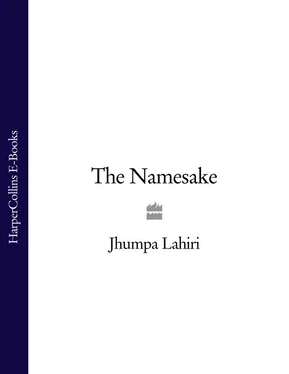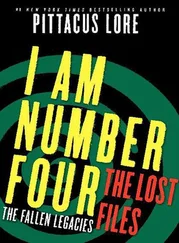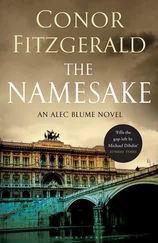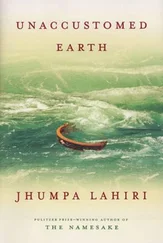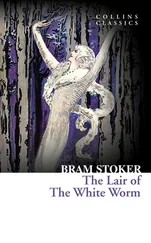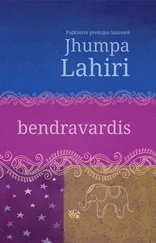Though the letter was sent a month ago, in July, it has yet to arrive. Ashima and Ashoke are not terribly concerned. After all, they both know, an infant doesn’t really need a name. He needs to be fed and blessed, to be given some gold and silver, to be patted on the back after feedings and held carefully behind the neck. Names can wait. In India parents take their time. It wasn’t unusual for years to pass before the right name, the best possible name, was determined. Ashima and Ashoke can both cite examples of cousins who were not officially named until they were registered, at six or seven, in school. The Nandis and Dr. Gupta understand perfectly. Of course you must wait, they agree, wait for the name in his great-grandmother’s letter.
Besides, there are always pet names to tide one over: a practice of Bengali nomenclature grants, to every single person, two names. In Bengali the word for pet name is daknam , meaning, literally, the name by which one is called, by friends, family, and other intimates, at home and in other private, unguarded moments. Pet names are a persistent remnant of childhood, a reminder that life is not always so serious, so formal, so complicated. They are a reminder, too, that one is not all things to all people. They all have pet names. Ashima’s pet name is Monu, Ashoke’s is Mithu, and even as adults, these are the names by which they are known in their respective families, the names by which they are adored and scolded and missed and loved.
Every pet name is paired with a good name, a bhalonam , for identification in the outside world. Consequently, good names appear on envelopes, on diplomas, in telephone directories, and in all other public places. (For this reason, letters from Ashima’s mother say “Ashima” on the outside, “Monu” on the inside.) Good names tend to represent dignified and enlightened qualities. Ashima means “she who is limitless, without borders.” Ashoke, the name of an emperor, means “he who transcends grief.” Pet names have no such aspirations. Pet names are never recorded officially, only uttered and remembered. Unlike good names, pet names are frequently meaningless, deliberately silly, ironic, even onomatopoetic. Often in one’s infancy, one answers unwittingly to dozens of pet names, until one eventually sticks.
And so at one point, when the baby screws up his rosy, wrinkled face and regards his small circle of admirers, Mr. Nandi leans over and calls the baby “Buro,” the Bengali word for “old man.”
“What’s his name? Buro?” Patty inquires brightly, bearing another tray of baked chicken for Ashima. Ashoke lifts the lid and polishes off the chicken; Ashima is now officially referred to by the maternity nurses as the Jell-O-and-Ice-Cream Lady.
“No, no, that is not a name,” Ashima explains. “We haven’t chosen. My grandmother is choosing.”
Patty nods. “Will she be here soon?”
Ashima laughs, her first genuine laugh after giving birth. The thought of her grandmother, born in the previous century, a shrunken woman in widow’s white and with tawny skin that refuses to wrinkle, boarding a plane and flying to Cambridge, is inconceivable to her, a thought that, no matter how welcome, how desirable, feels entirely impossible, absurd. “No. But a letter will.”
That evening Ashoke goes home to the apartment, checks for the letter. Three days come and go. Ashima is shown by the nursing staff how to change diapers and how to clean the umbilical stub. She is given hot saltwater baths to soothe her bruises and stitches. She is given a list of pediatricians, and countless brochures on breast-feeding, and bonding, and immunizing, and samples of baby shampoos and Q-Tips and creams. The fourth day there is good news and bad news. The good news is that Ashima and the baby are to be discharged the following morning. The bad news is that they are told by Mr. Wilcox, compiler of hospital birth certificates, that they must choose a name for their son. For they learn that in America, a baby cannot be released from the hospital without a birth certificate. And that a birth certificate needs a name.
“But, sir,” Ashima protests, “we can’t possibly name him ourselves.”
Mr. Wilcox, slight, bald, unamused, glances at the couple, both visibly distressed, then glances at the nameless child. “I see,” he says. “The reason being?”
“We are waiting for a letter,” Ashoke says, explaining the situation in detail.
“I see,” Mr. Wilcox says again. “That is unfortunate. I’m afraid your only alternative is to have the certificate read ‘Baby Boy Ganguli.’ You will, of course, be required to amend the permanent record when a name is decided upon.”
Ashima looks at Ashoke expectantly. “Is that what we should do?”
“I don’t recommend it,” Mr. Wilcox says. “You will have to appear before a judge, pay a fee. The red tape is endless.”
“Oh dear,” Ashoke says.
Mr. Wilcox nods, and silence ensues. “Don’t you have any backups?” he asks.
Ashima frowns. “What does it mean, ‘backup’?”
“Well, something in reserve, in case you didn’t like what your grandmother has chosen.”
Ashima and Ashoke shake their heads. It has never occurred to either of them to question Ashima’s grandmother’s selection, to disregard an elder’s wishes in such a way.
“You can always name him after yourself, or one of your ancestors,” Mr. Wilcox suggests, admitting that he is actually Howard Wilcox III. “It’s a fine tradition. The kings of France and England did it,” he adds.
But this isn’t possible, Ashima and Ashoke think to themselves. This tradition doesn’t exist for Bengalis, naming a son after father or grandfather, a daughter after mother or grandmother. This sign of respect in America and Europe, this symbol of heritage and lineage, would be ridiculed in India. Within Bengali families, individual names are sacred, inviolable. They are not meant to be inherited or shared.
“Then what about naming him after another person? Someone you greatly admire?” Mr. Wilcox says, his eyebrows raised hopefully. He sighs. “Think about it. I’ll be back in a few hours,” he tells them, exiting the room.
The door shuts, which is when, with a slight quiver of recognition, as if he’d known it all along, the perfect pet name for his son occurs to Ashoke. He remembers the page crumpled tightly in his fingers, the sudden shock of the lantern’s glare in his eyes. But for the first time he thinks of that moment not with terror, but with gratitude.
“Hello, Gogol,” he whispers, leaning over his son’s haughty face, his tightly bundled body. “Gogol,” he repeats, satisfied. The baby turns his head with an expression of extreme consternation and yawns.
Ashima approves, aware that the name stands not only for her son’s life, but her husband’s. She knows the story of the accident, a story she first heard with polite newlywed sympathy, but the thought of which now, now especially, makes her blood go cold. There are nights when she has been woken by her husband’s muffled screams, times they have ridden the subway together and the rhythm of the wheels on the tracks makes him suddenly pensive, aloof. She has never read any Gogol herself, but she is willing to place him on a shelf in her mind, along with Tennyson and Wordsworth. Besides, it’s only a pet name, not to be taken seriously, simply something to put on the certificate for now to release them from the hospital. When Mr. Wilcox returns with his typewriter, Ashoke spells out the name. Thus Gogol Ganguli is registered in the hospital’s files. “Good-bye, Gogol,” Patty says, planting a quiet kiss on his shoulder, and to Ashima, dressed once again in her wrinkled silk sari, “Good luck.” A first photograph, somewhat overexposed, is taken by Dr. Gupta that broiling hot, late summer’s day: Gogol, an indistinct blanketed mass, reposing in his weary mother’s arms. She stands on the steps of the hospital, staring at the camera, her eyes squinting into the sun. Her husband looks on from one side, his wife’s suitcase in his hand, smiling with his head lowered. “Gogol enters the world,” his father will eventually write on the back in Bengali letters.
Читать дальше
